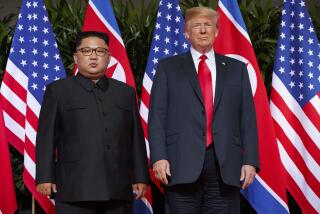Letters to Kids Give Insight to the Men Behind Presidency
No one in the Fina family could believe it when 8-year-old Chris Fina was invited to meet President Clinton in 1995. Then when Chris, who has muscular dystrophy, received a card from Clinton for his ninth birthday and another card when he was undergoing back surgery, the family was even more surprised.
“I was shocked when he said he wanted to see Chris,” says Donna Fina, the mother of the Breinigsville, Pa., boy. “I’d never met anybody famous like that. I didn’t know he’d do all that. And then when he sent the cards . . . well, it made Chris feel good.”
Clinton is far from the first president to write letters to children--historians have found letters from American presidents to youths dating as far back as George Washington.
The words of the most powerful people in U.S. history--presidents--to the country’s youngest citizens lend new insight to the men behind the letters, says Stanley Weintraub, who co-wrote “Dear Young Friend: The Letters of American Presidents to Children” (Stackpole) with his wife, Rodelle. The book consists of correspondence between children and presidents from Washington through Richard Nixon.
“It’s very interesting insight on presidents because they write very differently to children than they write to adults,” Weintraub says. “They don’t think they’re writing for publication. Many of them turned out to be much more admirable than people thought.”
According to the Weintraubs’ book, in 1906, Grover Cleveland wrote to a young boy sharing the same birthday: “We ought to be very good friends if we were born on the same day of the month, though there is a difference of 60 years in our ages. The years seem to pass much more quickly as a person grows older, and when you arrive at the age of 69, as I have done, you will wonder at the short distance between 9 and 69.”
In 1889, Benjamin Harrison wrote to a little girl from his home state of Indiana who had given him a penknife. With his letter he sent a doll.
“The little doll which you will find in the box with this letter is for you, and I hope you will think it is pretty. If the doll could talk, she would tell you how much I love to be loved by little children.”
Sometimes, presidents tried to teach children a lesson with their letters.
“I have had as much fun as anybody in my time and hope that you will have unlimited good times, but I wish I could make you realize now that play has nothing in it unless in back of it lies good, honest, hard work,” Woodrow Wilson wrote to schoolchildren in Trenton, N.J., in 1913.
Often, the lessons were aimed at their own children.
In 1910, William Taft sent a brusque two-sentence letter to his sons in Connecticut.
“You have not written your mother since you left Washington. What is the matter with you?”
In 1810, John Tyler sent a letter to his daughter Mary, criticizing her for her spelling in a letter she sent him.
But while some of the letters make presidents seem harsh, other letters soften a president’s image.
Weintraub points to letters Nixon wrote to John and Caroline Kennedy when they were children.
The Kennedys had just visited the White House and written thank-you letters to Nixon and his wife.
“We were particularly happy that your visit to the White House where you lived as a very young boy left pleasant memories. . . . I was glad your wish which you made on the Lincoln bed came true--when you need another one like that--come back to see us,” Nixon responded to John Kennedy Jr., then 10. “You will always be welcome in This House.”
“It shows a different side to a man people tend to think of as an ogre,” Weintraub says.
Daniel Wilson, a history professor at Muhlenberg College in Pennsylvania who is working on a book involving Franklin Roosevelt and polio, says FDR often responded to letters from children suffering from the disease.
“He told them to have courage and work hard at their physical therapy and do what the doctors wished,” Wilson says.
For his part, Chris Fina just knows one thing about what Clinton’s letter conveyed.
“It made me happy, really happy,” he says. “Just happy.”


